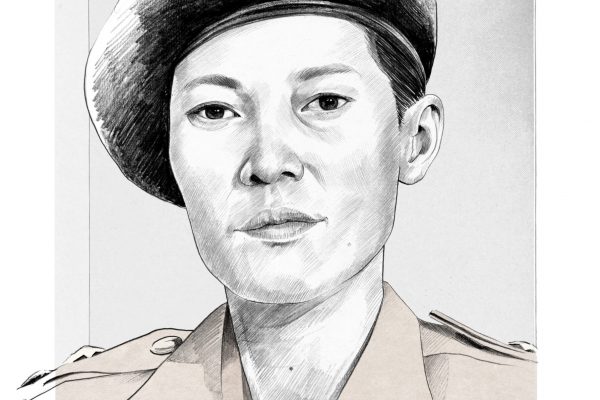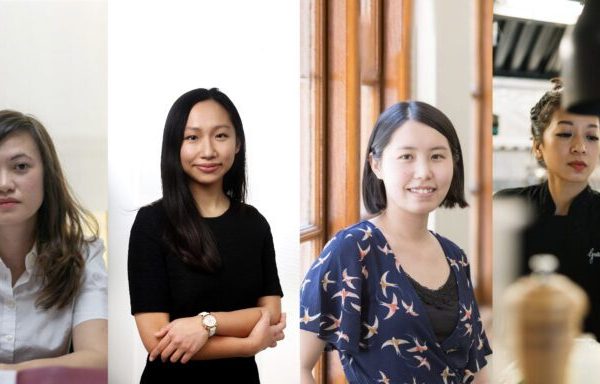Youth in Focus: Gaurika Pant imagines a world with zero trash in our oceans
In 2017, when Gaurika Pant attended her first beach cleanup in Discovery Bay, the Hong Kong International School student could not believe her eyes. Pant says she saw “a different side of the ocean” that day and the gravity of Hong Kong’s environmental crisis dawned on her.
Plastic and trash covered the beaches, posing dire threats to marine life. “I was astounded at the huge amount of trash we collected in two hours,” she says. “And I knew I needed to do more to address this problem.”
This was the wake-up call she needed to dive into environmental activism. Since then, Pant has made it her mission to raise awareness about plastic waste, research realistic solutions, and empower others to change their consumption habits.
The 17-year-old spends her free time volunteering at local Plastic Free Seas (PFS), where she conducts regular research on public behaviour and devises long-term solutions. An avid artist, Pant also uses her creativity as a tool to raise awareness about plastic waste.
Ariana spoke with Pant about climate activism, public awareness, and what individuals can do to reduce their carbon footprint.
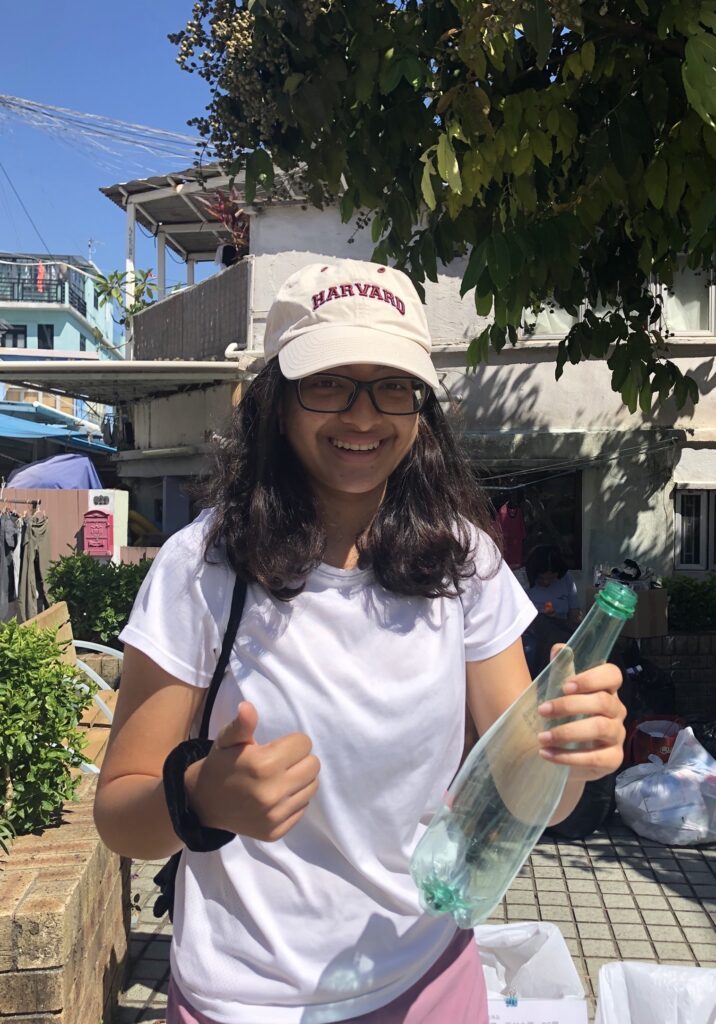 Credit: Gaurika Pant
Credit: Gaurika Pant
Ariana: Why is raising awareness about Hong Kong’s environmental crisis so important to you?
Gaurika Pant: Plastic waste ends up in our oceans and can be detrimental to marine wildlife. It takes years to biodegrade, and the tiny microplastics in our oceans have a very harmful effect on fish, and subsequently humans since we eat seafood.
I do as much as I can to educate my peers. One time, I organised a talk at my school, which was conducted by Dana Winograd, director of operations from PFS. She spoke to our class about the harmful effects of plastic waste on the environment.
The following day, my friends and teachers told me how they avoided using disposable cutlery at lunch. At that moment, I understood the power of spreading awareness.
Activism starts with bringing people’s attention to an issue. It showed me I was able to make a difference in someone’s behaviour and lifestyle, which gave me a sense of hope. If we can all take small actions, we will gradually be able to see a positive impact.
I imagine a world where there is zero trash in our oceans and we are living plastic-free lifestyles. I hope to educate and inspire others to change their behaviours and reduce plastic consumption.
Ariana: You’re very devoted to cleaning up trash in Hong Kong. Can you walk us through your various initiatives?
GP: I have been volunteering with PFS since I was 15 years old. I started by attending beach cleanups and now I make posters, infographics and social media posts to support their marketing efforts.
I love to create art – and, and I use my art as a tool to educate and raise awareness. I also create my own paintings and artwork using recycled materials that I pick up from beach cleanups.
Every month, I volunteer at a Tetra Pak carton recycling collection centre in Discovery Bay. These cartons – most commonly used for beverages like Vitasoy – are made with paperboard and thin inner linings of aluminium and polyethylene. If you separate the components, the cartons are fully recyclable. So I teach people how to break down the cartons and dispose of them correctly.
Similarly, I also volunteer at the Shek O Waste No Mall, where residents gather to collect, recycle, and segregate different types of plastics and materials.
I have also led community and corporate beach cleanups. We spend a few hours collecting trash from different beaches in Hong Kong. Then we sort, separate and dispose of it properly.
When it comes to school strikes for climate action in Hong Kong, I have attended all of them. Although these strikes tend to attract a small crowd, we have still been able to get wide media coverage. I think that this helps our cause massively and has brought attention to the issue to a wider audience.
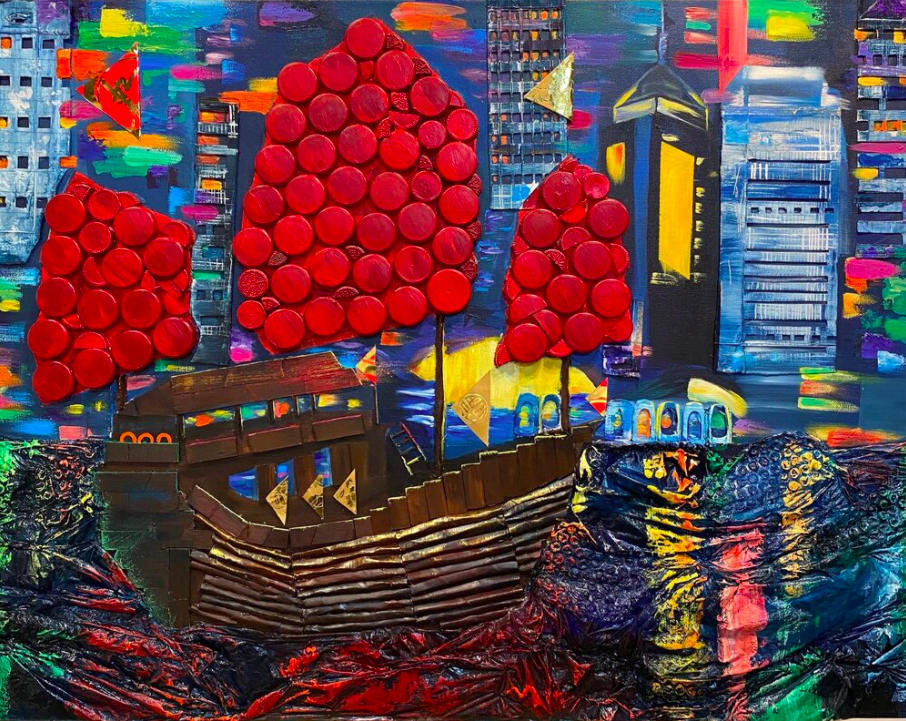 Artwork created from recycled materials by Gaurika Pant. Credit: Gaurika Pant
Artwork created from recycled materials by Gaurika Pant. Credit: Gaurika Pant
Ariana: What about the scientific side of your work? Have you studied Hong Kong’s environmental crisis?
GP: This past summer, I was an intern at the Department of Earth Sciences at the University of Hong Kong where I helped with laboratory research. I analysed microplastic samples and did a field visit to different beaches to collect data for the study.
The internship gave me first-hand experience, showing me how a research study is conducted. I really enjoyed it, because it exposed me to the scientific world.
Ariana: What have you learned about climate change and plastic pollution along the way?
GP: I have learned that the effects of climate change are slowly becoming irreversible if we don’t do anything about it soon. As a leader of my school’s environmental club, the Green Dragons, I also try to hammer this point home as much as possible.
As a club, we recycle and segregate the school’s trash every day after school and hold multiple events like Zero Waste Lunch Day, where participants bring their own lunch and container, and Energy Saving Day, where we use minimal electricity.
At school, we successfully persuaded our cafeteria to provide lots of plastic-free alternatives. For instance, the school Starbucks now serves drinks in reusable cups, and the cafeteria serves drinks in glass bottles. This also reminds students to bring their own cups or cutlery.
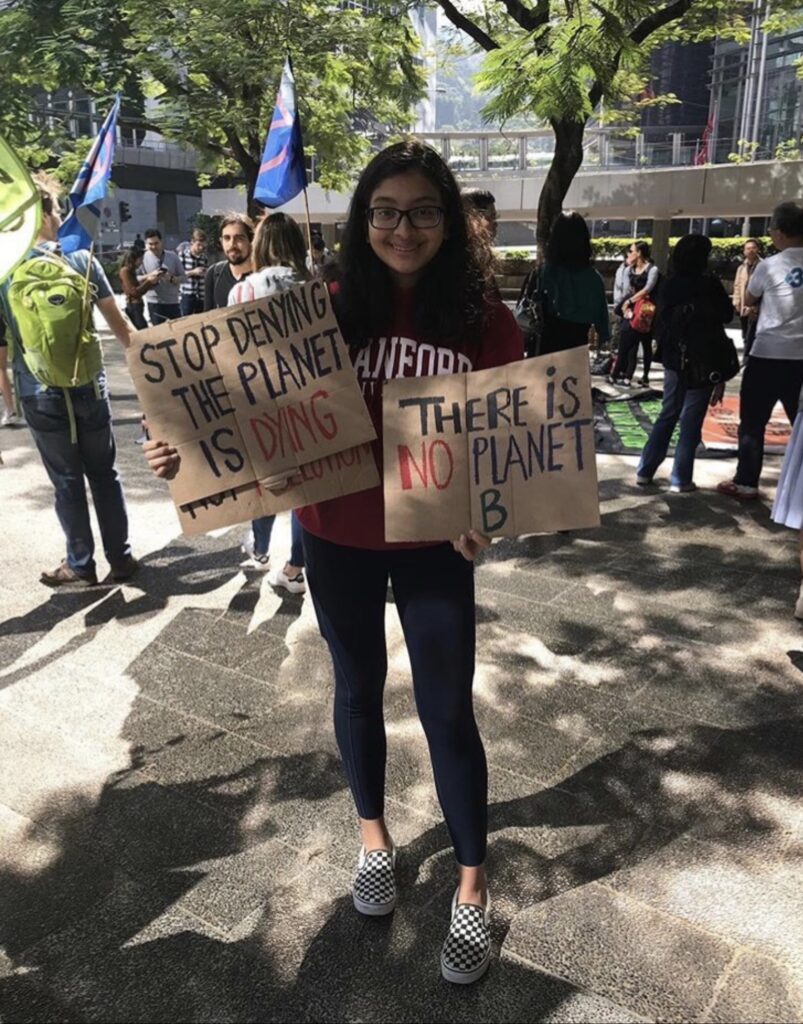 Gaurika Pant attends a climate strike. Credit: Gaurika Pant
Gaurika Pant attends a climate strike. Credit: Gaurika Pant
Ariana: You recently conducted a survey about mask pollution during Covid-19. What did you find?
GP: With people wearing masks daily due to Covid-19, I have noticed an alarming trend contributing to Hong Kong’s environmental crisis. I’ve seen masks littered everywhere: beaches, hiking trails, on the footpath. As an environmental enthusiast, it made me wonder what could be done to reduce and prevent this.
So I conducted a survey to understand people’s plastic consumption during the pandemic. In particular, I wanted to find out: How do we draw the line between health and sustainability?
I surveyed 170 people in Hong Kong, and found that 71 per cent of the individuals wear single-use masks while 29 per cent wear reusables masks. I also found that the same percentage use disposable containers versus reusable containers.
While it was great to see that 100 per cent of respondents wore masks and protected themselves, to see how many chose single-use masks alarmed me.
In terms of my action plan, I am encouraging people to make the switch to reusable masks and cutlery by posting messages on my social media and sharing informative articles.
If people can’t switch, then I highly encourage them to cut off the strings of the masks. This is because they can entangle and harm animals. It is important to discard them properly in closed bins.
Ariana: What more can individuals do to reduce their carbon footprint?
GP: We need to start small. Little things such as taking public transport or eating less meat will lower one’s carbon footprint. Another thing would be reducing energy consumption. Simple things like switching off idle electrical appliances or turning off lights can save energy.
Last but not the least, we need to stop using single-use plastics altogether. I would highly encourage people to find alternatives, such as carrying your own reusable cup and cutlery, using a bamboo toothbrush, and even buying food in bulk. There are many shops across Hong Kong where you can purchase such items in Sai Ying Pun and Kennedy Town.
Every year, more than 8 million metric tonnes of plastic enter our oceans so it is crucial for us to reduce our plastic consumption. These little steps and actions will eventually lead to bigger changes in the community.
